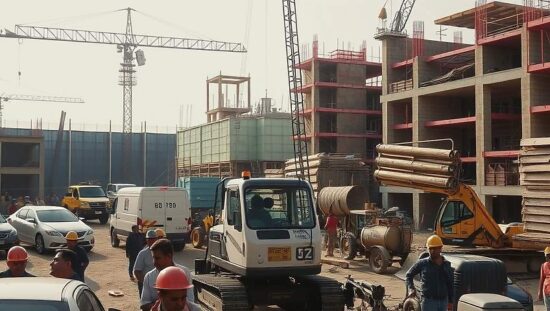The German Bundestag has approved a controversial legislative package, dubbed the “Construction Accelerator” designed to expedite housing construction and address the nation’s critical housing shortage. The bill, pushed forward by the governing coalition and met with unified opposition from other parties, aims to significantly streamline the building approval process, triggering a wave of criticism regarding potential environmental and societal consequences.
The core of the legislation involves the introduction of a new paragraph 246e into the Building Code (BauGB), granting municipalities the option to bypass existing zoning regulations. This would allow for the rapid approval of new residential units, potentially authorizing construction within as little as three months, without the need for extensive plan revisions. The bill further proposes amendments to paragraph 31 of the BauGB, enabling intensified residential development beyond established zoning plans, potentially facilitating building expansions, annexes and secondary row construction along existing streets and the expansion of commercial structures. The move also seeks to ease restrictions on building in currently unplanned areas and the periphery, while implementing “innovative” noise mitigation solutions to allow for increased housing near industrial areas, even at the potential expense of existing noise protection standards.
While proponents argue the measures are essential to tackle the acute housing crisis, particularly amidst geopolitical instability affecting agricultural land use and the need for food security, the move has drawn fierce criticism. Opposition parties, notably the Left, accuse the government of fueling speculative land practices rather than fostering the construction of affordable housing. Concerns are being raised that the accelerated process will lead to unchecked urbanization, the loss of valuable agricultural land and green spaces and a degradation of the quality of public areas. Critics also highlight a weakening of municipal planning autonomy, citing the potential for poorly planned developments lacking necessary infrastructure.
The Bundesrat, representing the German states, is expected to vote on the bill next week. They are signaling their intention to ensure continued adherence to essential health and environmental protections, specifically regarding noise pollution levels. The states also insist on safeguarding agricultural production areas, arguing for a long-term commitment to preserving them, particularly given the climate-induced environmental challenges.
Furthermore, the legislation includes provisions extending “conversion protection” – preventing the easy conversion of rental properties into owner-occupied units-by five years in areas with tight housing markets, a measure intended to protect tenants from displacement. However, this safeguard is not enough to quell the broader anxieties surrounding the potential long-term implications of the “Construction Accelerator” and its impact on Germany’s landscape and social fabric. The bill’s five-year timeframe adds an element of uncertainty and provides a limited window for assessment and potential adjustments in response to its implemented effects.





